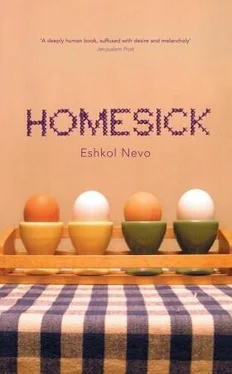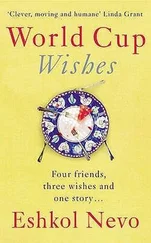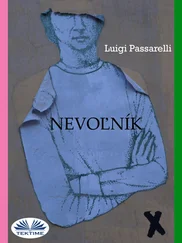Eshkol Nevo - Homesick
Здесь есть возможность читать онлайн «Eshkol Nevo - Homesick» весь текст электронной книги совершенно бесплатно (целиком полную версию без сокращений). В некоторых случаях можно слушать аудио, скачать через торрент в формате fb2 и присутствует краткое содержание. Год выпуска: 0101, ISBN: 0101, Издательство: Random House, Жанр: Современная проза, на английском языке. Описание произведения, (предисловие) а так же отзывы посетителей доступны на портале библиотеки ЛибКат.
- Название:Homesick
- Автор:
- Издательство:Random House
- Жанр:
- Год:0101
- ISBN:9781448180370
- Рейтинг книги:5 / 5. Голосов: 1
-
Избранное:Добавить в избранное
- Отзывы:
-
Ваша оценка:
- 100
- 1
- 2
- 3
- 4
- 5
Homesick: краткое содержание, описание и аннотация
Предлагаем к чтению аннотацию, описание, краткое содержание или предисловие (зависит от того, что написал сам автор книги «Homesick»). Если вы не нашли необходимую информацию о книге — напишите в комментариях, мы постараемся отыскать её.
Homesick
Homesick — читать онлайн бесплатно полную книгу (весь текст) целиком
Ниже представлен текст книги, разбитый по страницам. Система сохранения места последней прочитанной страницы, позволяет с удобством читать онлайн бесплатно книгу «Homesick», без необходимости каждый раз заново искать на чём Вы остановились. Поставьте закладку, и сможете в любой момент перейти на страницу, на которой закончили чтение.
Интервал:
Закладка:
*
The paper boy isn’t an angel or a cherub or a Beitar fan. He’s an older man. A factory manager who was fired two months ago and would rather deliver papers than be unemployed. And, besides, the early mornings when he doesn’t have to reveal his shame to the world are a time he enjoys. His wife is the only person to whom he told the truth. To his son he explained that the factory had a big order and he had to go in early because there was a lot of work to do. His voice shook when he lied, but the son — his mobile pressed to his ear — didn’t even hear.
Four-thirty in the morning. The sun is still only a rumour in the sky. The father is chugging along the street on his scooter tossing newspapers at the houses as he passes by. On the corner of Victory and Convoy Streets, a speeding car comes hurtling towards him out of the blue. He veers away and avoids a collision at the last moment. That’s the only thing he can do. But the street is slick and the scooter is old, and before he realises what’s happening, he’s sprawled face down on the ground, which is wet and cold. The car screeches to a halt. Three young men get out and walk tentatively towards him. He gets to his feet and waves his finger at them, ready to tell them it’s all their fault. What do you think you’re doing! In the middle of a residential street! You’re lucky I don’t call the police! But before he begins to speak, he sees through blurry eyes that one of the three is his oldest son. What are you doing here? he shouts, why aren’t you at home? The boy goes up to him, clasps his hands behind his back, and replies with some questions of his own. Are you OK? Are you hurt? Are you OK? I think so, the father says, feeling a bruised thigh, I just got knocked around a little. I’ll be all right. But why are you riding around at this time of night? We were at a party, is the son’s stammered reply, we just didn’t notice the time. You just didn’t notice … just didn’t notice … The father repeats his son’s words and one of the boys, probably the driver, lowers his eyes. But Dad, what are you doing here at four in the morning? the son asks, his voice full of surprise. And what are all those newspapers for? He picks a paper up off the street, looks at it and then gives his father a look he can’t ignore. Now it’s the father’s turn to be silent, to become reacquainted with his shoes. He steals a glance at his son’s friends in the hope they’ll understand that the answer won’t be given while they’re there. And after a few moments of silence (four people standing in the middle of the street, awkwardness filling the air) the friends say a polite excuse-us, and disappear into the darkness in their car.
Crickets chirp. Dogs bark. A father and son stand facing each other in the dark. They don’t know what to say to each other. The son is thinking: so this is why his father has been going to sleep so early and hardly speaks to his mother. This is why his eyes are so sad and you hardly ever hear him laugh. The father wonders whether it’s time to stop hiding. Or maybe he should say he’s doing a favour for a friend. But he decides to tell the truth in the end. The son doesn’t say a word, and he can feel his lower lip quiver. When his father has finished, he looks at the newspapers scattered on the street and asks, do you still have a lot more to deliver? It looks like we really ruined your morning. Maybe I can help you out. The father presses the light switch on his watch, and is upset to see how late it is. He really doesn’t need to get fired again. Getting fired from the factory caused him enough pain. When he hears what his son says, he hesitates: no, it’s too late. Go home to bed. You know your mother will be sitting up waiting for you. Don’t worry, the son insists, it’ll go faster if we do it together. He bends down and gathers the newspapers, one by one. The father picks up the scooter and opens the box on the back for his son. The boy arranges the newspapers neatly inside. The father locks the box and thinks: maybe things aren’t as bad as they seem. There they are — a team.
The dawn is hinting at its arrival as the first strips of light over the mountains begin to show. If there were roosters in the Castel, they’d be starting to crow. The son hugs his father from behind on the scooter, and the contact makes them both feel good. The wind blows through their hair and brings tears to their eyes. Sometimes they stop in front of a house and the father explains: we have to go around the garden and put it through the bars. Here, the lady of the house asked me to put the paper in a vase. Her neighbours steal it and sometimes she doesn’t see one for days. There’s a loose tile here. There’s a dog over there, so steer clear.
Towards the end, they reach the apartment where Noa and Amir live.
For these people, the father explains, you have to throw the paper on the roof. Why? Look at all those rocks. The guy I replaced broke his leg here in the dark. That I can do without. Besides, at first I saw that the papers were accumulating up there, but not now. They figured it out.
The son pulls a newspaper off the decreasing pile, takes aim and sends it flying through space. But he throws it too hard, and it lands in the wrong place.
*
Thwack. Moshe Zakian is woken up by a blunt object hitting his forehead. He opens his eyes in surprise. He’s not in his own bed. For a moment, it’s not clear how he got into this situation. What am I doing here? he asks himself in frustration. Suddenly, he notices a newspaper on the floor. He feels his forehead where it was struck a moment before. From where he’s lying, he can read the headlines, something about a security warning. Outside, it’s almost light. It’s cold, so he wraps the blanket around his body. Gradually, the morning clouds surrounding his thoughts disperse and Moshe Zakian is fully awake. What a shame. For a few days, his thoughts had given him a break. He’d fixed the dripping tap in the sink. Sima had baked a cake. He’d read bedtime stories to the children. She’d looked at him longingly from the living room. It had seemed that they were putting an end to their feud. But yesterday she went with Noa, the student, to the kindergarten on Elijah the Prophet Street and came back in a fighting mood. He sat in the living room, hugging a pillow, avoiding her eyes. He absorbed one volley. Then another. And he could feel his blood pressure rise. Finally, he answered her, still trying not to offend. But instead of focusing on the argument at hand, she’d attacked him for his pronunciation. The word’s dai-dactic , not dee-dactic , she’d said with a sneer, and he tightened his grip on the empty glass of juice and snapped, why can’t you stick to what we’re talking about, why do you keep trying to insult me? But she wouldn’t stop.
You don’t understand, Moshe, that’s exactly what it’s about. If you want him to talk that way too, send him to that kindergarten and he’ll turn out just like you.
If only — he thinks, counting the parts of himself that hurt — if only you’d stopped there, you’d be sleeping in a warm bed right now. If only he’d managed to get the conversation back on track in time, they could have reached an agreement somehow. But no. He insisted on charging through a bright red light with a bus full of rage. Like me? What do you mean, like me? It wouldn’t be so bad if he talks like me when he gets to be my age.
*
Talk to me, I say to Noa, I want to hear. But she scoots to the edge of the bed and curls up into a ball. She folds her long legs under her, and her black hair hides her face and twists around her neck. The brightly coloured top she wore to Bezalel today suddenly seems out of place. Her thighs, so white and delicious, are showing from under her dress, but this isn’t the time. She must have got a bad mark for something she handed in. I move closer and envelop her in a hug. More accurately, in the contours of a hug. She’s trembling in my arms. Probably crying. Like in Bob Dylan’s song, she acts just like a woman, but she breaks like a little girl. I hold her tight and whisper in her ear. Don’t worry, what do they know. What kind of people decide to be lecturers in Bezalel? The ones who don’t have enough talent. And then they take their frustration out on their students. She’s trembling harder. I try from another angle. You know I believe in you, don’t you? Don’t you? She nods slightly, almost imperceptibly, but it gives me hope. I kiss the part of her cheek that’s exposed. My lips linger on the salty skin. Noni, I really think your project was great. Your friends thought so too. So one lecturer didn’t like it, so what? In another five years, when he wants to see your exhibition in New York, tell him you’re sorry, but there are no more invitations, OK?
Читать дальшеИнтервал:
Закладка:
Похожие книги на «Homesick»
Представляем Вашему вниманию похожие книги на «Homesick» списком для выбора. Мы отобрали схожую по названию и смыслу литературу в надежде предоставить читателям больше вариантов отыскать новые, интересные, ещё непрочитанные произведения.
Обсуждение, отзывы о книге «Homesick» и просто собственные мнения читателей. Оставьте ваши комментарии, напишите, что Вы думаете о произведении, его смысле или главных героях. Укажите что конкретно понравилось, а что нет, и почему Вы так считаете.












